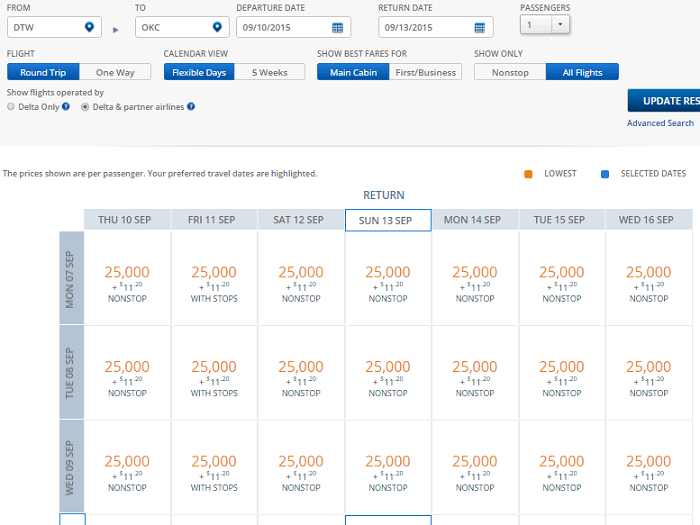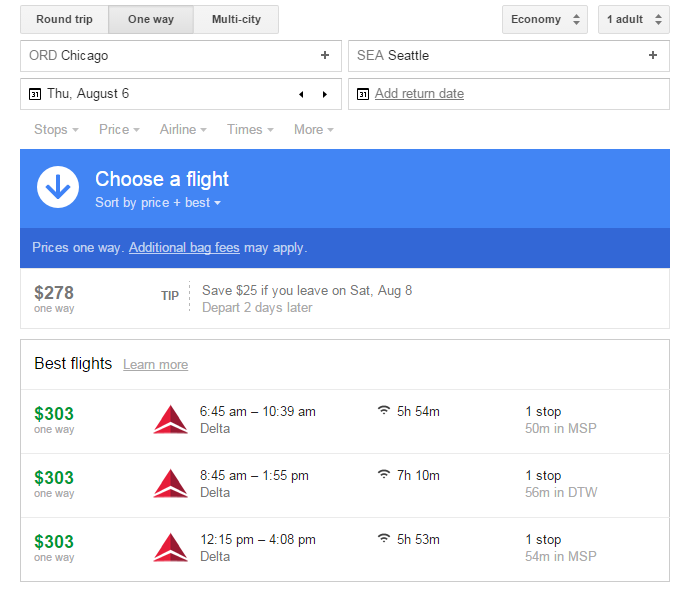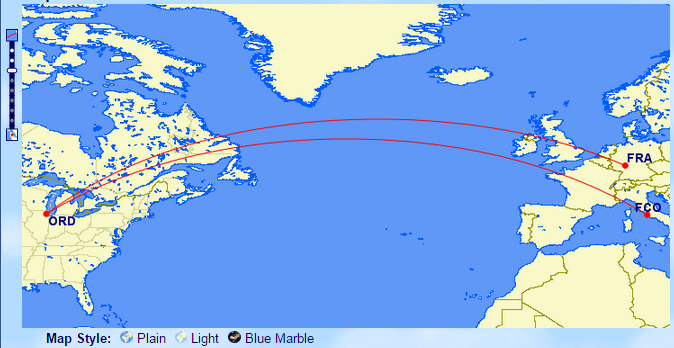Last week I wrote a three part series about how to think about the value of your frequent flyer miles.
Miles Aren’t Free: How To Value Your Redemptions
Miles Aren’t Free: How To Value What You Earn
Miles Aren’t Free: Establishing An Overall Value
The entire series could have been boiled down to three points:
1. The awards for which you redeem set an upper bound on your valuation.
2. The time and effort you expend to earn miles set a lower bound.
3. You should only redeem miles when you can get more value out of them than you “paid” to acquire them
That was really it in a nutshell.
Well, some folks read a little too much into it and got the idea that I was saying you should never redeem for economy awards because they have a lower redemption value. And that couldn’t be further from the truth.
The irony is that the original concept for the post was supposed to be about why it’s OK to redeem for economy awards. I intended to show that by explaining how you just need to make sure you are getting a decent redemption value.
I guess I got a little wrapped around the axle in the process and the message was lost. So I’m going on record as stating that it is indeed perfectly fine to redeem for economy awards, so long as you are getting good value from them.
Here are three tips to get more value from economy awards.
Fly To Small, Expensive Airports
A very good use of miles can be flying to small, thinly-served cities. These places often lack competition from the low-cost carriers, and as such the legacies keep fares pricey. The load factor on many of these routes, however, isn’t really all that high, meaning that there may be just as many or more award seats as more popular routes.
As an example, my in-laws like to travel between Detroit and Oklahoma City to visit my brother-in-law and his family. That route is dominated by Delta, at least for non-stop travel, and the fares are expensive — I don’t think I’ve ever seen it go below $300, and $450 isn’t unheard of.
Perhaps counter-intuitively, it’s not uncommon to see saver level Delta awards for 25,000 miles round-trip. (Well, if we even know what saver means on Delta anymore, but that’s another topic.) Here’s what they look like in September.

Using 25,000 miles to offset a $450 ticket equates to a redemption value of 1.8 cents per mile (CPM). (Yes, I’m ignoring the “opportunity cost” of the miles you would have earned on a revenue ticket.) Here’s the equation, in case you forgot.

Since my in-laws have demonstrated that they are ready, willing, and able to pay the $450 ticket price a couple of times per year, this award absolutely offsets cash that was going to come out of their wallet. That means that the 1.8 CPM in redemption value is real since there’s no question about whether they were really going to take the flight.
Ben values Delta miles at 1.3 CPM so don’t let anybody tell you that this is a bad redemption.
Book Last Minute Tickets
Airlines have you over the barrel when you need to get somewhere immediately. So-called walk-up fares for same-day or next-day travel can be outrageous. This really stings when you have a family emergency since it can seem like the airline is just piling on. Bereavement fares that once offered cheaper tickets following a death in the family are mostly a thing of the past, so these days you pretty much just have to bite the bullet.
Unless you have stash of miles.
Say you just found out that you need to fly from Chicago to Seattle tomorrow. The cheapest one-way revenue ticket with a connection is $303 on Delta, while the cheapest non-stop — which presumably you would prefer given that this is an emergency — is close to $500.

United, however, has saver level award space on two of their three non-stops such that you can book this ticket for just 12,500 miles. It’s true that you’ll pay a $75 close-in ticketing fee if you aren’t a Platinum, 1K, or Global Service member, but that’s still a good deal.

Even assuming that you would just take the connecting flight on Delta for $303 and that you have to pay the $75 award ticketing fee, this redemption clocks in at 1.8 CPM. Since the fee for this award ticket isn’t negligible, I modified the equation to include it.

Again, this redemption value is real given that you are ready, willing, and able to whip out your credit card and buy that $303 flight on Delta because it’s an emergency after all. And just like before, a 1.8 CPM redemption is nothing to scoff at.
This is perhaps the number one reason that I advise all of my friends and family to keep an emergency stash of miles in their account at all times.
Use Open Jaws And Stopovers
There are a lot of ways to derive more value from your awards by exploiting loopholes and secrets in region-based award charts. Although many of them require advanced skills that are beyond the scope of this discussion, you don’t need to be an award booking ninja to at least start thinking about it.
Say you’ve moved beyond doing a domestic award — which is the most common frequent flyer mile redemption on the planet– and are now thinking of booking a trip from the US to Europe. Maybe you live in Chicago and want to visit Germany and Italy, for example. A lot of people think that they need to book a round-trip award from Chicago to Frankfurt and back, and then book their intra-Europe flights separately with cash.
Well, one possible money saver is to book Chicago to Frankfurt, and then Rome to Chicago. This is called an open-jaw and is allowable on most programs. The number of miles required is the same, but now you only need to buy a one-way intra-Europe flight. That may seem obvious, I know, but you might be surprised….

Since you were ready, willing, and able to pay for those flights between Frankfurt and Rome, you just derived extra value from the award ticket. That could make the difference between deciding to book with cash or use miles.
Depending on the mileage currency you are using, you may even be able to get the connecting flight from Frankfurt to Rome included in the award as a stopover. Now you can fly Chicago <> Frankfurt <> Rome <> Chicago, all on one award.
Conclusion
In general, there is nothing wrong with redeeming for economy awards. In fact, I do it frequently. The key is to always think about whether you are getting enough value to justify the use of miles. In other words, make darn sure that you’re getting more value out of them than you put into acquiring them.
I presented a few ideas for ways to get a lot of value out of economy awards, but there are clearly many more. Hopefully this helps you to think creatively about how to get more value from your economy award redemptions.





Another situation is hub to hub. For example, only United and Frontier fly nonstop between SFO and IAH. (Yes Southwest flies SFO to HOU.) United's fares are often $500+. I've never seen them below $400. I've seen them over $1,000 last minute. I don't feel so bad when I'm getting over 2 CPM, but I'm missing out on the PQM.
I would submit to you that United miles should never be used for a close-in booking in domestic UA Y because of this fee. It's so much easier to collect MR than MP that I would only use MP domestically if it was for a shorthaul award or perversely, to fly AC because Aeroplan charges YQ on those flights but MP doesn't.
I recently used tips #1 and #3 to book a trip to Southeast Asia for my husband and myself. I knew we wanted to go to Chiang Mai, so that's our first stop instead of the larger and cheaper hub of Bangkok. We're using Chiang Mai as a stopover before ending up in our "final destination" of Hanoi, again passing through but not stopping in Bangkok. We'll pay out-of-pocket for a cheap ticket back to...
I recently used tips #1 and #3 to book a trip to Southeast Asia for my husband and myself. I knew we wanted to go to Chiang Mai, so that's our first stop instead of the larger and cheaper hub of Bangkok. We're using Chiang Mai as a stopover before ending up in our "final destination" of Hanoi, again passing through but not stopping in Bangkok. We'll pay out-of-pocket for a cheap ticket back to Bangkok from Hanoi (it's looking to be about $250 for two tickets). Then, we used Singapore points (and about $110 cash for fees) to get from BKK to SIN. Then we're flying out of Singapore to get back home to the States. This itinerary cost us 160,000 United points plus about $200 in fees for two tickets. If we would've paid cash, it would've been over $10,000.
Don't forget about Canada, where even advance fares can be very high compared to the more competitive landscape south of the border. With lots of family up there, I've always found great value redeeming UA 12.5k awards on AC (3 CPM or better).
Points With A Crew -- That's a helpful post, but just to be aware it actually involves booking the United flight via Aeroplan. For those with United miles, it's not going to work.
Bgriff -- Absolutely agree that fuel surcharges basically kill the economy redemption, particularly on BA to Europe. That's actually one of the reasons that I don't value AA miles as highly as Ben.
Eponymous coward: Very good point and another good use. I've also had friends book one-ways to or from Europe who were doing study abroad or a long-term internship and didn't know their return dates.
Using miles for shorthaul travel within Australia can also make a lot of sense.
The twist here is that anytime you are subject to fuel surcharges, the value from economy redemptions usually drops to virtually nothing. It pains me dearly when I see people redeem AA miles for BA economy tickets...
There is a way to get around the $75 close-in booking fee on American and United, depending on what kind of miles you have. I used that trick to help my sister take a last-minute trip
http://www.pointswithacrew.com/how-to-book-united-american-without-75-close-in-booking-fee/
It involves using an alliance partner (like Air Canada or British Airways) that DOESN'T charge the $75 fee
In addition, most one-way economy tickets from Europe or Asia to the USA are horribly, punitively expensive compared to a round-trip.
Friends of mine regularly go on repositioning cruises to Europe from the USA, and then burn one-way economy tickets back. The CPM on those is typically very good.